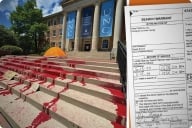You have /5 articles left.
Sign up for a free account or log in.
Students who need the most help planning for either college or a career after high school often do not receive it. Virginia Community College System officials, however, believe they have found a way to assist these students, who are sometimes overlooked by their guidance counselors in favor of their gifted or at-risk peers. Their method? Meet these students where they are, right in the halls of their high schools.
For four years, the system has employed “career coaches” who are based on-site at a number of the state’s public high schools. In 2005, the program had 11 coaches in 13 schools. Now there are about 110 coaches in more than 140 schools, serving about 40 percent of the state’s secondary students.
The program is Virginia’s answer to President Obama’s call for every American to have at least one year of postsecondary education, whether it is temporary skills training or the first step on the way to a college degree. The program also promises to boost the number Virginians who seek some sort of further education, and it is showing early signs of success at the community college level.
The coaches work one-on-one with students to set career goals and create an academic road map to help them get where they want to be. Free from having to resolve the scheduling conflicts and disciplinary issues that dominate the professional lives of many high school counselors, the coaches operate differently from the guidance counselors, with whom they work.
Elizabeth Creamer, the system's director of Postsecondary Perkins/Tech Prep, compared the coaches to executive headhunters who help career professionals find positions. She argued that, since they come from the postsecondary world, they have a wealth of resources that most high school guidance counselors do not, and can be a better advocate for their students.
The secondary role of these coaches shifts according to the needs of their local high schools. Sometimes, Creamer noted, they will help students and parents figure out the financial aid system, or give pointers on how to strengthen a résumé. At other times, she added that they will host career fairs and even offer college placement testing at their high school.
Even though the coaches work for the community college system, they are not simply advocates promoting their two-year institutions. Creamer said they make sure students are aware of the wide array of postsecondary options they have, from career and technical credentialing to the state's four-year institutions.
Community college enrollments, however, grew 7 percentage points more last academic year out of high schools that have coaches than from those that do not. Though not the original intent of the program, Virginia officials say it is a great side effect. The system currently only has numbers for community college enrollment growth, but will track growth in four-year college-going rates beginning next year.
Elizabeth Whiston-Dean, a career coach at Pulaski County Senior High School who works for New River Community College, said she was afraid, going into her position last year, that she would simply be seen as a promoter for her two-year institution. But she said her students, their parents and the high school’s administration have not seen it that way.
“I tell students up front that I don’t work for the high school and that I work for the community college,” said Whiston-Dean, a former high school guidance counselor herself. “I don’t work on commission. I do my job based on what’s best for the student. I’m here to reach students who didn’t think they were college material find their way. This is really a significant service from the community college with no strings attached no matter the student’s choice.”
Whiston-Dean believes that it is especially important for the program to reach out to students in rural parts of the state, such as southwestern Virginia, where access to higher education is limited. Her high school has even taken extra steps to ensure that her services are well promoted among the student body.
Although most career coaches give roving presentations about their services before classes in their high schools, Whiston-Dean noted that her institution has promoted them in other ways. She said some English instructors, for example, have assigned writing projects about possible careers that make it easier for these students to start a dialogue about their goals. She noted that most juniors and seniors actively seek her out, and she hopes that these other methods of promotion will help underclassmen do the same when they begin thinking about life after graduation.
Nicole Walker, career coach at Booker T. Washington and Bayside High Schools, who works for Tidewater Community College, said her schools have a formal referral process by which some instructors or counselors can suggest that certain students see her if it is well-known that they do not have any post-secondary plans. Sometimes, she said, it is just a matter of showing qualified students that college is an option for them.
“Just recently, I had a student come back to see me after two years,” Walker said. “She wasn’t planning on doing anything after graduation. Her parents are factory workers and weren’t college educated. They were just happy to have her graduate from high school. Even though she had a great GPA, she just didn’t think about college at all. She came to some meetings with me and now, I hear, she’s at [the College of] William and Mary. That doesn’t say anything about the guidance counselors here. They were happy to help. But I actually had the time to dig deep and help her out.”
Jasmine Philip, career coach at Petersburg High School who works for John Tyler Community College, echoed a similar sentiment. Contrary to popular belief, she said, today’s students are not apathetic about college and their futures, they are just uninformed.
“What I find in these students is that they are seeking information,” Philip said. “They don’t know that they need some kind of post-secondary education. They often don’t have parents or siblings that have gone through the higher education system, so they’re just unaware. As a result, I’m bombarded by students on a daily basis.”
Virginia’s “career coaches” program will cost about $1.8 million this year, though most of this is covered by federal and state grants, including funds from the Workforce Investment Act, the Perkins Act and the Department of Education's Gaining Early Awareness and Readiness for Undergraduate Programs. Though Creamer said it was never the goal of the state to have these coaches at every public high school, she noted more will almost certainly be added in the future. In addition, she noted that the program is currently working on ways to track the success of its students as they enter either postsecondary training or education to see the extent to which their methods are working.








